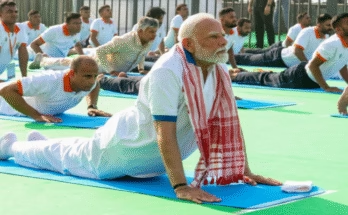
by Ashis Sinha
As China grapples with an outbreak of human metapneumovirus (HMPV), doctors and health experts are advising against panic, despite rising concerns on social media and overcrowded hospitals. The outbreak, which comes five years after the Covid-19 pandemic, has led to reports of overwhelmed crematories and claims that multiple viruses, including influenza A, HMPV, Mycoplasma pneumoniae, and even Covid-19, are circulating. However, no official confirmation has been made regarding the declaration of a state of emergency in China.
HMPV is a respiratory virus that typically causes flu-like symptoms, with some cases leading to more severe lower respiratory infections. It is most common in winter and early spring. While the virus shares symptoms with the flu and common cold—such as coughing, fever, nasal congestion, sore throat, and shortness of breath—it can spread easily through coughing, sneezing, or personal contact. The incubation period for HMPV is usually between three to six days, and the severity of the illness can determine how long symptoms last.
Health experts warn that certain groups, including young children, older adults, and individuals with weakened immune systems, are at a higher risk of developing severe complications from HMPV. In some cases, the virus can lead to bronchiolitis, pneumonia, asthma flare-ups, and even ear infections.
With no specific antiviral treatment or vaccine available for HMPV, prevention remains crucial. Doctors recommend frequent hand washing, covering coughs and sneezes, wearing masks, and avoiding close contact with sick individuals. Self-isolation is also advised for those who are ill to help curb the virus’s spread.
Despite these concerns, Dr. Atul Goel, an official from India’s Directorate General of Health Services (DGHS), urged the public not to panic. “Metapneumovirus is like any other respiratory virus causing common cold symptoms,” Dr. Goel said. He emphasized that while there is an increase in respiratory infections during winter, hospitals are well-prepared with necessary supplies and beds to handle the situation.
Dr. Goel also reassured the public by stating that India has not seen a significant rise in respiratory infections in December 2024, and no large outbreaks have been reported from domestic hospitals. The National Centre for Disease Control (NCDC) in India is closely monitoring seasonal respiratory infections and is in contact with international health agencies to stay informed.
As the virus continues to spread in China, some have expressed fear of a global health crisis reminiscent of the early days of the COVID-19 pandemic. Meanwhile, Chinese authorities have maintained that they are transparent about the situation, insisting they have shared information on the outbreak “without holding anything back,” despite calls from the World Health Organization (WHO) for more data on the virus’s origins.
Experts continue to stress the importance of general respiratory precautions and preventive measures, emphasizing that there is no cause for alarm at this time.



